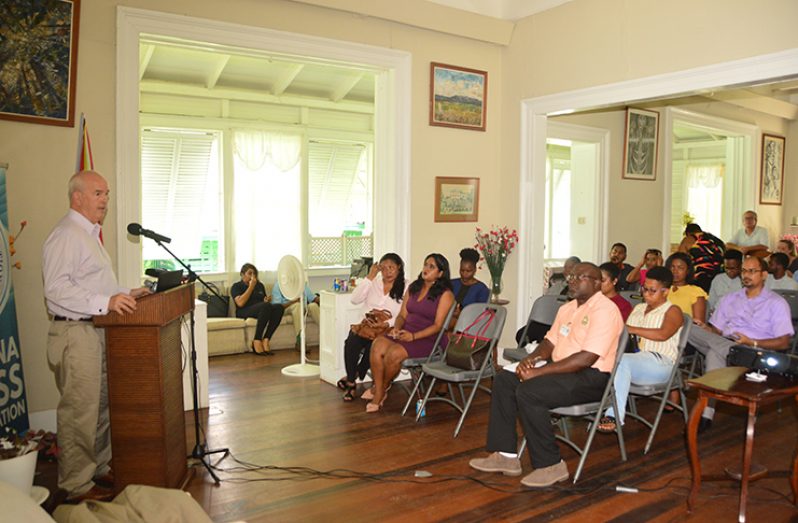– US Professor
GUYANA is doing its homework and laying the foundation for both oil and gas and a ‘green’ economic development.
This is according to Director of Julie Ann Wrigley Global Institute of Sustainability at Arizona State University, Professor Gary Dirks. He stressed too that government needs to ensure ExxonMobil complies with all environmental safeguards.
On Friday at a lunchtime lecture at Moray House Trust, Camp Street Georgetown, hosted by the Guyana Press Association in partnership with Conservational International Guyana, Professor Dirks said Guyana does not have the experiences in dealing with the oil and gas sector and there are no shortcuts.
Professor Dirks said since arriving with his team on Monday he noticed that the country is very unique and cannot be compared to others.
“There is absolutely no reason why you can’t have a green growth agenda pursued aggressively and being an oil producing nation at the same time,” he stated.
The professor who is visiting Guyana for the first time said oil is very much needed in the world, “the world would die without oil right now, because the energy that is vital [to the] functioning of society comes from oil today, therefore, we have to provide these resources.”
He explained that ExxonMobil is the best in the business since in their field the best are hired in all sectors. “There is nobody whose technology is any better than theirs (ExxonMobil), there is nobody that is more disciplined in the way they do things.”
He continued: “The world needs this oil, and frankly, if done right, the country of Guyana can benefit from it… ExxonMobil will go out of their way to ensure that there are no accidents which would compromise your fisheries, but they have to be watched as everybody else, and that is the responsibility of the government and the Press,” the Professor underscored.
Professor Dirks, who once worked with British Petroleum and was a fierce competitor of ExxonMobil, said Guyana must find consensus on the best way to use its resources since it’s essential to the development of the energy sector, human capital, infrastructure, capacity building and sustainable development in the beginning while evolving in time.
With careful planning, he said, the country can minimise its environmental footprint, while at the same time raising the standard of living for the population.
Forestry and eco-tourism can also be pursued sensibly so as not to undermine the sense that Guyana is a green economy. However, he said citizens need to be involved in the planning for the future.
The professor explained that in a meeting with University of Guyana officials, it was clear that there are plans to develop skillsets and opportunities for Guyanese in the future.
Noting that it was revealed that a very significant number of graduates from the university leave the country, he said that Guyana needs to find ways to retain its graduates and ensure that the country grooms a diversified batch of engineers for the future since there is much development that needs to be done.
Presently, government is working assiduously to put legislative and regulatory frameworks in place, such as the crafting of the Petroleum Commission Bill and a Sovereign Wealth Fund, to safeguard the oil and gas industry.
Ahead of first-oil in 2020, the World Bank in June approved a US$35M Development Policy Credit to strengthen Guyana’s financial sector and fiscal-management capabilities. In excess of 3.7 billion oil-equivalent barrels have been discovered in nine wells: Liza, Payara, Liza Deep, Snoek, Turbot, Ranger, Pacora Longtail-1 and most recently Hammerhead, and the World Bank wants to ensure that the country is well equipped to transform its oil wealth into human capital.
Presently, nearly one in four people in Guyana live in poverty, however, experts estimate that GDP will surge when commercial production of newly discovered oil and gas begins.



.jpg)








